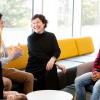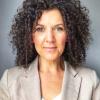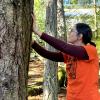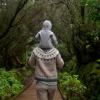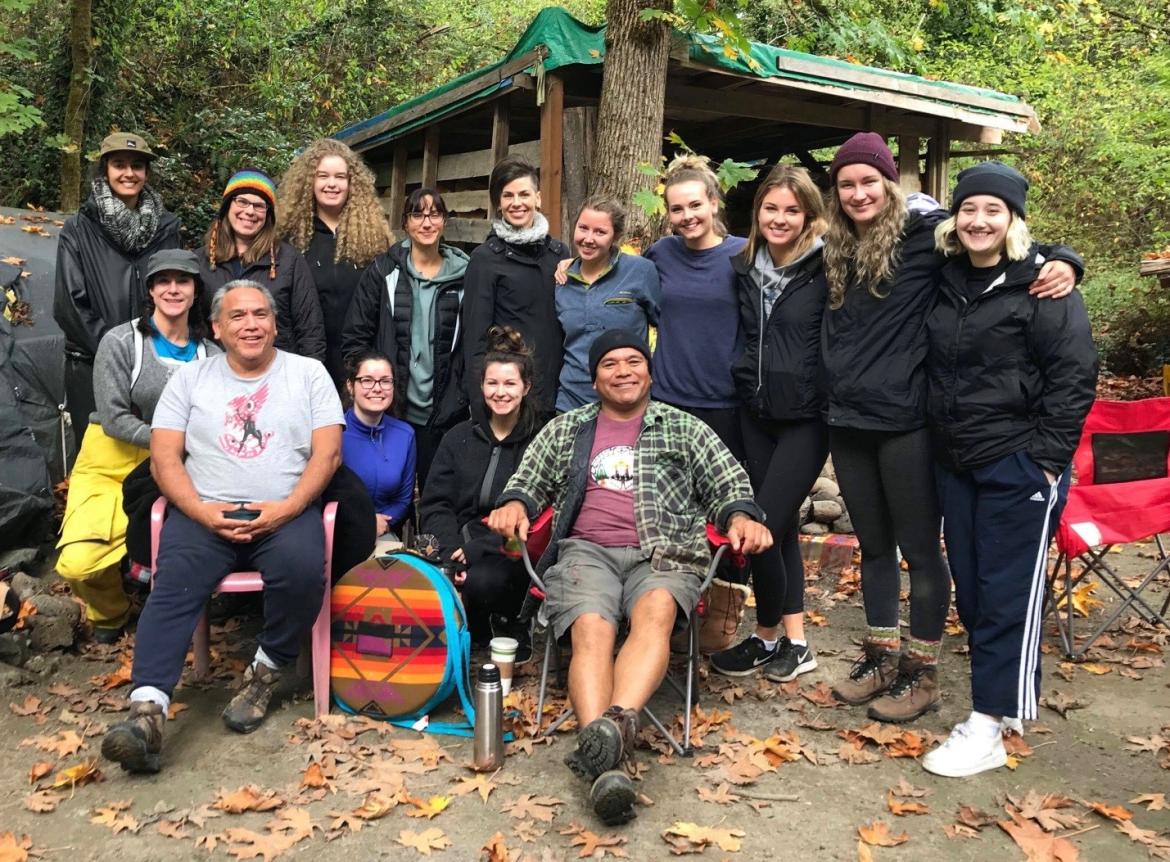
Students in VIU Cowichan’s Bachelor of Education program have access to a unique, land-based education program co-taught by Cowichan Tribes Elders, a VIU professor and community members.
December 5, 2018 - 12:00pm
Enhanced connections to the land, a deeper appreciation for the culture of local First Nations communities and the desire to pass these experiences on to others were key takeaways for students enrolled in a land-based teacher education course offered at Vancouver Island University’s (VIU’s) Cowichan Campus.
Co-taught by Education Professor Nadine Cruickshanks and eight Cowichan Elders, the Sustainability and Teacher Identity course takes a holistic, experiential and land-based approach to learning about sustainability. Over eight weeks, the Elders took turns guiding students in the following activities:
- Hwiem’ (Elder in Residence Marlene Rice) – Hwtheequt Sy’wen (guidance on protocol)
- Luscheem (Arvid Charlie) – q’ushin’tul (walking together) - Cowichan River teachings
- Hwiem’tun (Fred Roland) – hi-naunnuts’a (by yourself)
- Qwiahwultuhw (Robert George) – tistsiwatul (working together paddling canoe journey)
- Hyamiciya (Della Rice Sylvester) – slhexun (plant medicine)
- Tousilum (Ron George) – wutth’els (weaving)
- Sulsameethl (Deb George) – wutth’els (weaving)
- Tsulhwuletse (John George) – wutth’els (knitting)
“This class was life-changing for me,” says Amanda Funk, a second-year Bachelor of Education student. “I have a different perspective on education now thanks to my experiences. As we listened and learned from the Elders teaching the course, the idea that knowledge can be passed on orally, that it doesn’t always have to be out of a book, started to click for me. I’m going to continue to pursue ways of knowing from Elders in the community and take my students outside for similar experiences.”
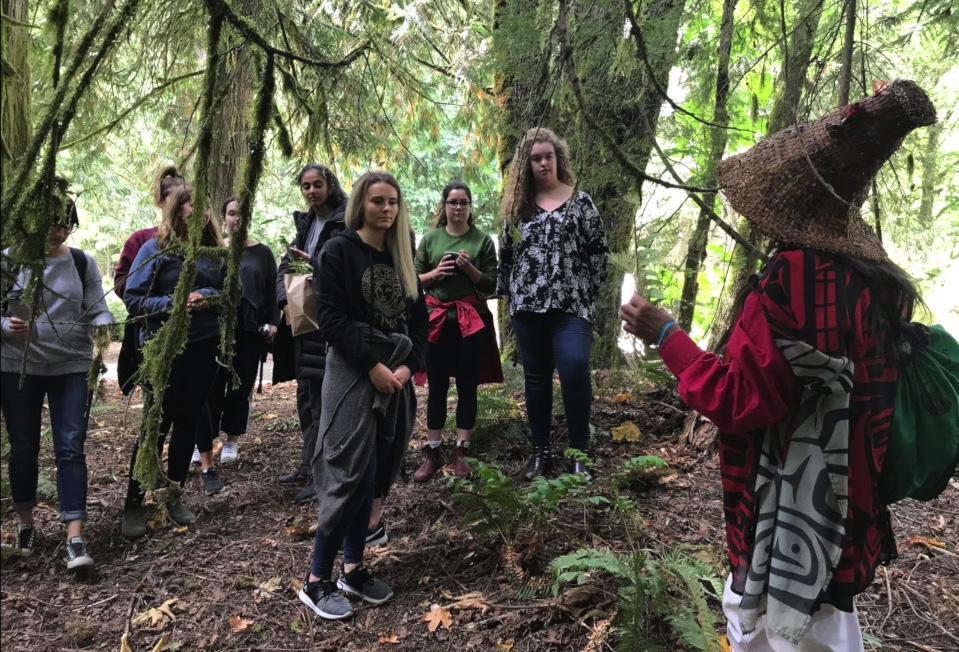 One of Funk’s favourite activities was a trip to a forested area along the Cowichan River, where each student was required to spend half a day on their own in the woods for a traditional experience called hi-naunnuts’a.
One of Funk’s favourite activities was a trip to a forested area along the Cowichan River, where each student was required to spend half a day on their own in the woods for a traditional experience called hi-naunnuts’a.
“Traditionally, our members do four days solo in the forest, but I could see how much even just a half day affected all the students,” says Cowichan Tribes Elder Rob George Qwiahwultuhw. “They were more open and honest and genuinely themselves when they came back.”
George says teaching this course has been an empowering experience for him.
“It gave us a voice. Our people haven’t traditionally had a voice in the community, in education,” he says. “I really felt like the students gained an understanding of what we’ve been talking about for years and years. It’s important because these students are going to change how things are talked about in the school system.”
Students also benefited from the knowledge of other community members, such as 16-year-old Sierra Robinson, a certified permaculturist and co-founder of Earth Guardians, who taught the importance of youth voice, regeneration, advocacy and active citizenship. Katy and John Ehrlich, of Alderlea Farm & Cafe, welcomed students onto their farm to experience firsthand the workings of biodynamic farming, food security and ethical farming practices.
This is the second year VIU Cowichan has offered this course. Cruickshanks says what makes the course unique is the co-creation model, where Cowichan Elders play a key role in designing learning outcomes and experiences for students. Core competencies reflect Indigenous ways of knowing and being, including understanding the energy of all living beings; being able to connect with all the senses; feeling comfortable being on the land; understanding protocol in various experiences and encounters; and understanding what can give life and good health.
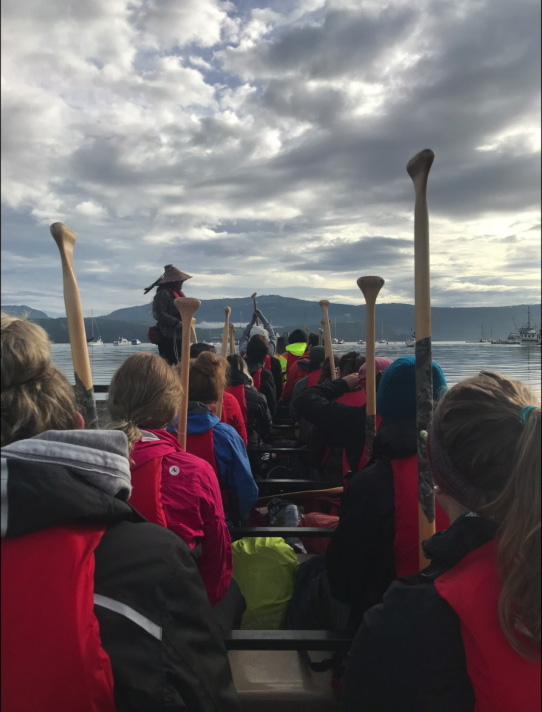 “It’s about breaking barriers and building bridges,” says Cruickshanks. “We cannot move forward with the Truth and Reconciliation Commission’s calls to action – and the direction of the new BC curriculum – if we don’t respectfully and intentionally involve connections to land, to First Peoples’ of this land, and to the true history of these teachings, injustices and significance. I believe students now recognize that you can’t teach this solely out of a textbook; they plan to continue to connect with Elders in their communities.”
“It’s about breaking barriers and building bridges,” says Cruickshanks. “We cannot move forward with the Truth and Reconciliation Commission’s calls to action – and the direction of the new BC curriculum – if we don’t respectfully and intentionally involve connections to land, to First Peoples’ of this land, and to the true history of these teachings, injustices and significance. I believe students now recognize that you can’t teach this solely out of a textbook; they plan to continue to connect with Elders in their communities.”
Professor Anne Jenkins, whose fifth-year Bachelor of Education class joined the Elders for about half of the sessions, says students feel better prepared to address the calls to action by being inclusive and responding to injustices and inequities both in the classroom and in their personal lives.
“The VIU Faculty of Education is delighted to be working closely with community Elders,” says Dr. David Paterson, Dean of the Faculty of Education. “Through deep conversation we have begun to rethink our pre-service teacher education program at all levels.”
-30-
MEDIA CONTACT:
Jenn McGarrigle, Communications Officer, Vancouver Island University
P: 250.740.6559 | C: 250.619.6860 | E: Jenn.McGarrigle@viu.ca | T: @VIUNews
Tags: Education | Teaching and Learning

